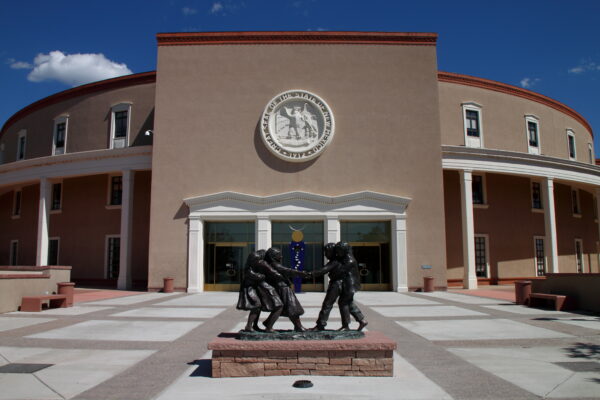The most recent elections have made clear that New Mexicans are ready to move forward with a more progressive agenda rooted in justice, equity, and liberty. Still, our state is not immune to the deepening polarization and systemic discrimination occurring in the rest of the country. With so much at stake, the time to act is now. This legislative session we need your help to ensure access to abortion, pass much-needed police reform, reduce the numbers of people in our prisons and jails, and tackle inequities in education for Native students. Keep an eye out for updates from us with opportunities for you to help.
Here are more details on our 2023 legislative priorities.
Access to Abortion
New Mexicans deserve the dignity and respect to decide what is best for themselves and their families. Although abortion care remains safe and legal in New Mexico, much work remains to ensure access to this vital right. A collection of reproductive rights bills would protect patients’ privacy, prohibit interference in New Mexicans’ personal decision making and access to healthcare throughout the state and protect New Mexicans and our neighbors from attempts to criminalize reproductive healthcare by out-of-state entities.
Police Use of Force Standards
Every year, New Mexico has one of the highest—if not the highest—rates of killings by police in the country. New Mexicans deserve to trust that calling a police officer will help make a situation safer – not cause it to end in tragedy. Proposed legislation would establish a statewide use of force policy for police across the state, require police officers to prioritize de-escalation first, and require reporting of all officer-related injuries or deaths.
Equity in Education
All children deserve an education that prepares them to be college and career ready. But many New Mexico students – and Native students in particular – lack access to the education they need and are legally entitled to. Along with the Tribal Education Alliance, ACLU-NM is forwarding a bill that would establish a “trust fund” for Nations, Tribes, and Pueblos to develop their own educational capacity to support Native students.
Second Chance for Children
Any parent knows children are different from adults. Brain-development research shows they lack the judgment and self-control that come with adulthood. Proposed legislation would ban life without parole as a sentencing option for children, as 25 states, Washington DC, and every other country in the world have already done. The bill also creates developmentally meaningful timing for parole eligibility for people already serving long adult sentences for crimes committed as children.
Probation and Parole Reform
Probation and parole were designed to be an alternative to incarceration and long sentences, but these systems have become a series of traps that lock people back up – often for things like missing an appointment or failing a drug test. A new bill would create a uniform system for probation and parole sanctions across the state and stop judges and parole boards from sending people back to prison for minor violations.
Court Fines and Fees & Debt-Based Driver’s License Suspension
No one should land in jail or lose their driver’s license because they cannot pay court fees, fines, and other costs. In New Mexico, fines and fees are levied at every stage of the criminal legal system including penalties surcharges and other costs that bear no relation to punishment for an offense or unsafe driving. People who are unable to pay them can lose their drivers’ licenses or face jail time, making it impossible to go to work, take kids to school, and provide for their families. Two bills would eliminate all fees within the criminal legal system to prevent people from being incarcerated simply because they cannot afford exorbitant fees and limit the widespread practice of suspending driver’s licenses when people can’t afford a fine or fee.
Solitary Confinement
Long-term isolation does nothing to rehabilitate prisoners and exacerbates mental illness – or even causes it in prisoners who were healthy when they entered solitary confinement. New Mexico prisons inflict this costly punishment on far too many people and fail to accurately report how many people are subjected to it. Legislation would prohibit keeping a person in solitary confinement for more than 15 consecutive days and no more than 45 days in a year and prohibit the use of restricted housing for anyone under 22 and over 65 years old.
Office of Prision Ombudsperson
Throughout New Mexico, there are over 15,000 people in jail or prison. Many prisoners routinely suffer abuse and inadequate care in our state’s overcrowded and understaffed facilities. Legislation would create transparency by implementing independent oversight of all prisons in New Mexico and establishing a public rule making process that allows for meaningful public feedback when changes are made to our carceral system.
The Right to Vote
The right to vote is central to participating in our democracy, but Native communities and people who were incarcerated are all too often systemically cut out of the process. One piece of legislation would end double standards in tribal requests for polling stations, give tribes the right to provide input on precinct boundaries, and require county commissions to incorporate input from tribal communities on changes to voting that impact them. Because New Mexico does not automatically restore the right to vote to people who have been incarcerated, another bill would ensure that upon release from incarceration, people convicted of a felony regain their constitutional right to vote.
We have an ambitious agenda for our state. Join us in making it a reality.
You can find more information on each bill in our legislation section of this website.


